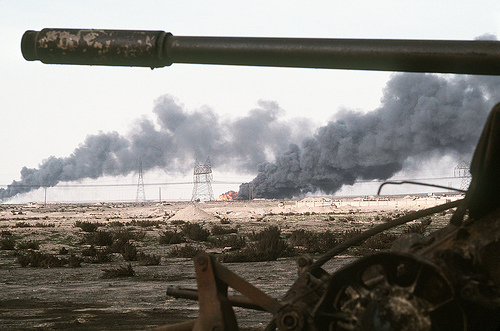“I slept very well my first two nights in New York and had no dreams, but I think it was because of the jetlag. The rest of my nights have been full of dreams and nightmares. In one dream I am stuck in Falluja and I can’t get out. I am on the ledge of a high wall that separates the American soldiers from the insurgents. They both see me and are ready to shoot. In another dream I am kidnapped by the Iraqi Army and thrown into a dungeon with a foreign reporter. In yet another, I go to Baghdad and find the streets empty. There are only roofless houses and ruined walls.”
Ayub Nuri, an Iraqi who recently immigrated to the U.S., “My War Away From War,” New York Times, 2-16-07, p. A19
“Sometime during my four years of traveling to Iraq, I developed a recurring dream in which a Middle Eastern country invades the United States and occupies, among other places, my old neighborhood on the South Side of Chicago. The dream flashed briefly through my mind on Thursday as I walked the dirty, broken streets of Sadr City, a teeming Baghdad slum that forms the power base of Moktada al-Sadr, the radical Shiite cleric.
Here is what happens in the dream: Because I know a little Arabic, I somehow find myself a translator for the invaders, even as some of my Chicago buddies are in the alleys plotting against my employers. And each night when I walk home along my beloved Dearborn Street under the rusty elevated tracks and past the White Hen grocery store, I wonder what the guys poring over maps in their armored vehicles plan to accomplish against a few million South Siders fighting in their own alleys. That’s usually when I wake up.
That dream, a nightmare, really, flashed through my mind as I stood at the end of a filthy, pothole-riddled alley talking with a small-time deputy commander in the Mahdi Army, the militia that is the armed wing of Mr. Sadr’s political movement. Standing there with his arms folded over his potbelly as his fighters scurried about behind him, the man who called himself Riadh, 34 years old, was effectively deputy commander of an alley.
“We can’t face the armored tanks of the Americans face to face, because all we have is light guns,” he said. “So we just wait for a chance to attack something.”
He could be dead now, because the next day at least one American helicopter swooped over Sadr City and engaged in a gun battle that killed four, according to American military officials, although Iraqi police put the toll much higher. Or the potbellied deputy could still be out there, plotting his next move. Either way, before dismissing the ragtag Mahdi fighters, it would be well to remember that — partly because the alleys of the neighborhoods they control are too narrow for the Iraqi Army’s armored vehicles — Mahdi units like Riadh’s have been fighting Iraq’s federal forces to a standstill in Basra, the country’s southern port city, for nearly a week now.
Alleys: they are dangerous only when used by those who grew up in them. That is the basic reason Mr. Sadr and his fighters simply will not go away in this war….
As I sit here writing this piece, listening to the intermittent whooshes and booms of rockets and mortars fired into the Green Zone, almost certainly by Mr. Sadr’s fighters, I can no more predict where the conflict is headed than I can say what will be in my dreams tonight during the few hours of sleep that this war and my editors allow me. But when it comes to Mr. Sadr’s loyalists in the alleys of Basra and Baghdad, one thing is irrefutable.
In those alleys, waking up will not end the dream.”
James Glanz, American reporter in Baghdad, “Bad Dreams: Alley Fighters,” New York Times, 3-30-08, “Week in Review” p. 1.

